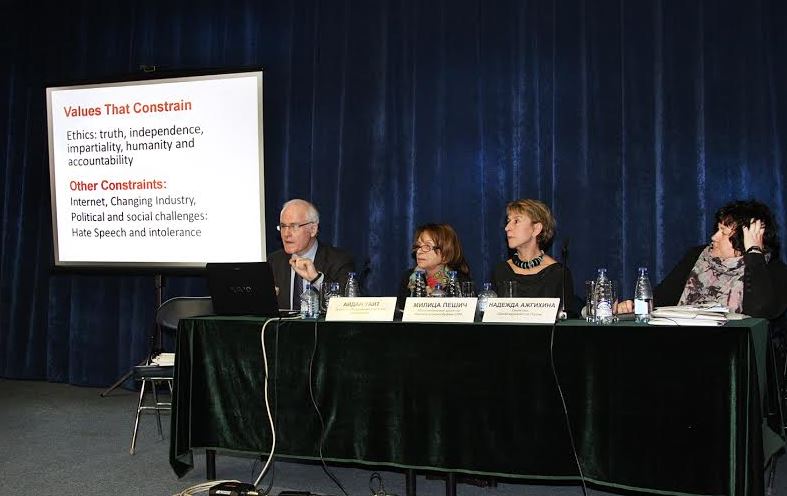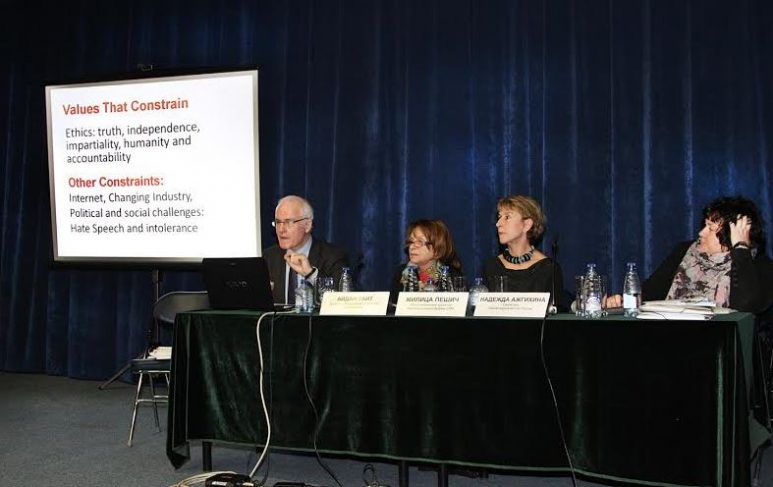Date: 20 March 2014
Country: Russia, Moscow
 “The challenge of diversity and tolerance in Russian society is felt today more than ever, and no more so than in the world of media, where internal and external pressures pose threats to the quality of journalism needed to promote pluralism and human rights for all”. These were the warnings that Aidan White, director of the Ethical Journalism Network (EJN), shared with the participants of the Moscow conference, organised by the Media Diversity Institute (MDI) and the Russian Union of Journalists (RUJ).
“The challenge of diversity and tolerance in Russian society is felt today more than ever, and no more so than in the world of media, where internal and external pressures pose threats to the quality of journalism needed to promote pluralism and human rights for all”. These were the warnings that Aidan White, director of the Ethical Journalism Network (EJN), shared with the participants of the Moscow conference, organised by the Media Diversity Institute (MDI) and the Russian Union of Journalists (RUJ).

The multimedia conference was a final dot on the MDI project, which aspires to contribute to greater freedom of expression for all viewpoints in Russian society, and to promote equality and fight discrimination, by equipping journalists with the skills to report ethically and inclusively on ethnic and racial diversity.
The participants – editors, reporters, researchers and journalism educators, union activists, media NGOs, and anti-racism campaigners – had an opportunity to get details of the media monitoring done in four Russian regions. The monitoring findings were presented via video link by Anna Sevortian, a leading Russian human rights activist. The conference debate was shared with more than 300 social media users via Facebook and Twitter across the globe due to current interest in the involvement of Russia in the Ukrainian crises and the role media plays in this and similar situations.
Talking about the lessons learnt through the implementation of the project, Natalia Bitten, project country coordinator, insisted that more practical and continued work with young Russian journalists is needed.
Vasily Baldicin, the RUJ Secretary responsible for regional cooperation insisted on the need to have a relevant Code of Ethics: “We need the Code of Ethics the way Christians needed 10 Commends, but it doesn’t mean we’d be sinless”.
Responding to the debate on the need of a proper definition of ‘hate speech’, Nadezda Azgikhina, the RUJ Secretary responsible for international cooperation, said: “Journalism is a public good, thus we, journalists, need to define what WE believe can be harmful for our audience and we need to take a responsibility for how we deal with those words.”
“That editors and journalists must alert to the danger of how media can foment discrimination and that they must do more to eliminate all forms of discrimination whether based on national or ethnic origin, religion or belief, disability, gender, age, or sexual orientation”, said Milica Pesic, Executive Director of Media Diversity Institute, closing the conference. Pesic thanked in particular the main beneficiaries of the project – young journalists who managed to have produced – and have published – more than 170 articles on religious, ethnic and gender diversity, during the period of less than four months.
Summarising the debate, Aidan White listed the main tasks ahead of media actors in Russia which will be shared as a draft Statement, with the leading media actors via RUJ and serve as the basis for their further work: “The Press Freedom and journalism carry special responsibilities and the ethical duties of media professionals oblige them to protect their audience against hate speech, intolerance and incitement to violence in all its forms.”
For full text of the Declaration please see here.
The Media Diversity Institute (MDI) work is supported by the Foreign and Commonwealth Office.

